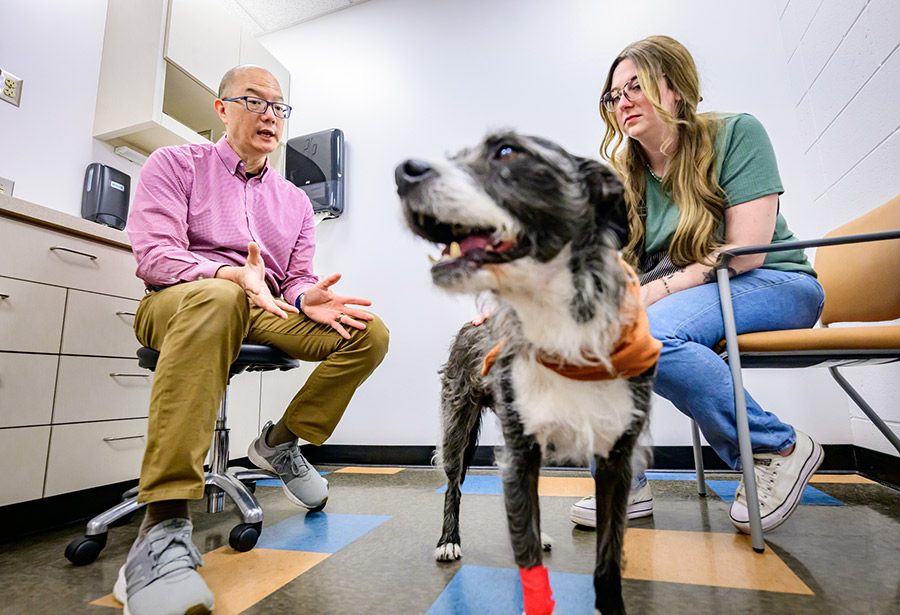What is your academic background? (Where did you get your undergraduate/other degrees?)
I studied Animal Biology and Conservation Science as an undergraduate student in the University of Ghana, Legon.
How did you become interested in your specific field?
In high school, I was fascinated with Biology, but I didn’t know which specific field to delve into. Medicine was the popular option then, but it was not a field I wanted to pursue. In the University of Ghana, courses such as Microbiology, Public Health Zoology, and Molecular Biology piqued my interest. During this time, I was introduced by a mentor to Prof. Michael David Wilson, a leader in the field of elephantiasis and hookworms, who later helped me obtain an infectious disease internship at the Noguchi Memorial Institute for Medical Research (NMIMR), in Ghana. This internship involved travelling to remote areas in Ghana to screen and treat people who were infected with parasitic worms.
Despite how rigorous this was, I found it incredibly fulfilling to see the direct impact of our work on underserved populations. These experiences in the field inspired my undergraduate thesis research which quantified the efficacy of albendazole (a dewormer) against an understudied parasite, the dwarf tapeworm.
After graduation, I joined the Wilson lab as a research assistant at NMIMR where I examined the association of human hookworm infection with alterations in the composition of the gut microbiome. Prof. Wilson was a great mentor and role model who provided a supportive and engaging environment for my development as a budding scientist.
At this time, I had so many unanswered questions about the gut microbiota, its impact on health, and how this knowledge could be harnessed to treat or prevent disease. One day, I found an article in the journal Science on successful fecal transplantation in humans and this was when I knew that I wanted to pursue research on gut bacteria.
Why did you choose the University of Illinois College of Veterinary Medicine to pursue this degree?
My decision to study in the University of Illinois College of Veterinary Medicine was first based on my interest in the research program by my current graduate advisor, Prof. Christopher Gaulke. Also, reading about the Department of Pathobiology and the University of Illinois spurred this interest and desire to pursue a PhD here primarily because of how they encouraged diversity. I realized that the University of Illinois College of Veterinary Medicine will provide me with the right avenues to thrive as a budding scientist.
What is your current research project?
My current research project focuses on changes that occur in the gut microbiota as a result of exposure to pesticides. Gut bacteria can modify chemical toxicity via microbial metabolism, and this tends to have important consequences on health. It is therefore important to look at these changes and find ways to mitigate these exposures and consequences. For this research, I am using the zebrafish as the animal model because many of the genes and critical pathways are highly conserved between humans and zebrafish. Also, zebrafish contain a diverse metacommunity of intestinal microbes and provide valuable insights into interactions between gut microbes and host immune and metabolic processes.
What impact do you think your research could have on society?
Humans and animals are exposed to pesticides and other harmful chemicals daily. They are present in the food we eat, water we drink, toys our children play with, kitchen utensils, among other things. It is therefore necessary to understand the impact of these chemical exposures on health in order to inform ways to reduce or eliminate exposure to these chemicals.
What has been most beneficial to you in completing your studies at the University of Illinois College of Veterinary Medicine?
Having a great support system and a graduate advisor who takes his time to help me understand every aspect of my research have been the most beneficial things to me. The faculty in my department are also amazing- it is clear they care deeply about their students and provide exceptional opportunities for them to further their professional careers. Also, they have expertly placed chairs by the windows facing the football field which provides excellent ambience for reading scientific papers.
What are your passions outside of research?
One of my greatest passions is to motivate young girls to aspire to achieve greater things for themselves despite what society dictates. I make good use of every encounter with a young girl as a stage for a motivational speech.
Also, I draw comics based on both science and non-science topics which I share on Instagram. My intention for making the science comics is to increase appreciation for science among lay people.




